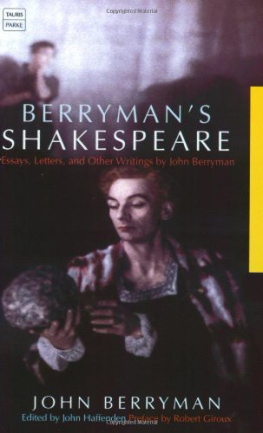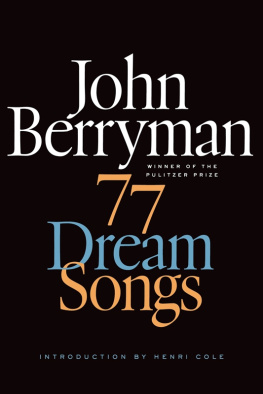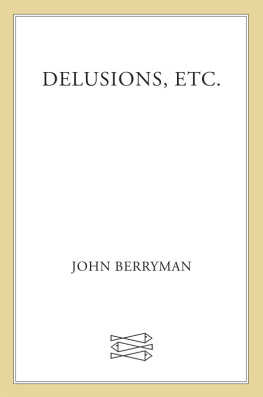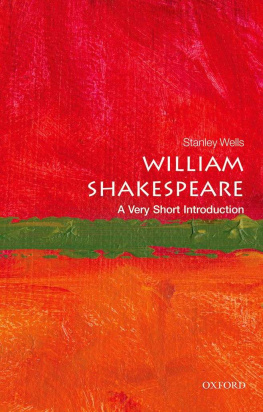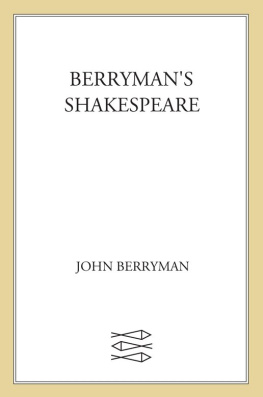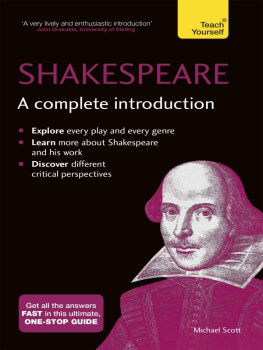John Berryman - Berrymans Shakespeare
Here you can read online John Berryman - Berrymans Shakespeare full text of the book (entire story) in english for free. Download pdf and epub, get meaning, cover and reviews about this ebook. year: 2001, publisher: Tauris Parke Paperbacks, genre: Art. Description of the work, (preface) as well as reviews are available. Best literature library LitArk.com created for fans of good reading and offers a wide selection of genres:
Romance novel
Science fiction
Adventure
Detective
Science
History
Home and family
Prose
Art
Politics
Computer
Non-fiction
Religion
Business
Children
Humor
Choose a favorite category and find really read worthwhile books. Enjoy immersion in the world of imagination, feel the emotions of the characters or learn something new for yourself, make an fascinating discovery.
- Book:Berrymans Shakespeare
- Author:
- Publisher:Tauris Parke Paperbacks
- Genre:
- Year:2001
- Rating:5 / 5
- Favourites:Add to favourites
- Your mark:
Berrymans Shakespeare: summary, description and annotation
We offer to read an annotation, description, summary or preface (depends on what the author of the book "Berrymans Shakespeare" wrote himself). If you haven't found the necessary information about the book — write in the comments, we will try to find it.
The work of Shakespeare was Berrymans abiding passion and he devoted a lifetime to writing about it. His extensive writings on the subject have now been collected and edited by John Haffenden and reveal that Berrymans interest in the canon of Shakespeares work was profound and far-reaching. John Berryman, one of Americas most talented and influential modern poets, acquired a reputation as an innovator with a bold literary style. He was also an active, prolific, and perceptive critic whose own experience as a major poet served to his advantage. The New York Times Book Review described him as not only one of the most gifted Americans of his time, but also one of the most honorable and responsible. This perceptive and engaging compilation will be enjoyed by all who share Berrymans passion for Shakespeare.
From Publishers WeeklyIssued in the wake of major books on Shakespeare by Harold Bloom and Helen Vendler, this compendium of admiring, cogent and reflective essays, which have remained uncollected since Berrymans suicide in 1972, testifies to the unusually resilient and enduring value of the Bards oeuvre. A poet known primarily for his sequence poem The Dream Songs (1969), Berryman gave three lecture series on Shakespeare but left his ambitious written projects, including an annotated edition of King Lear and a critical biography, unfinished. Given these circumstances, readers will be grateful for Haffendens extensive introduction, which helpfully contextualizes the bibliographical ambiguities of the extant editions of the plays. The books five sections afford readers an opportunity to examine Berrymans lifelong obsession with Shakespeares characters, imagery, plots and, crucially, the textual puzzles that convinced him that poets make better annotators than editors. The introduction and notes to his edition of Lear are included, as is his correspondence (a letter to his mother illustrates his healthy, wry sense of humor, imagining Shakespeare now merry with wicked joy peeping over Olympus at sorrowful scholars). In essays arranged both chronologically and by individual play, Berryman offers readings of the plays that are not only fresh and immediate but reflect his own literary personae. He identifies prevailing themes, examining in the tragedies both sexual loathing and the Displacement of the King; in The Tempest he notes how often, and with what longing, sleep is invoked. Like the writings of Coleridge and J.V. Cunningham, this is a book that relishes its resources, by a poet-critic who felt Shakespeares language on the pulse.
Copyright 1999 Reed Business Information, Inc.
When one great poet decides to study and write on the work and life of another, magic can occur. Berryman, winner of the Pulitzer Prize and the National Book Award, conjured some powerful magic with his examination of Shakespeare. Collected and edited by Haffenden (The Life of John Berryman, LJ 12/15/82), these writings, produced from the late 1940s until the poets death in 1972, offer insight into both the works of Shakespeare and the mind of Berryman. Divided into five parts, the book also collects Berrymans biographical studies, eight lectures (most notably Shakespeare at Thirty), eight essays, and his last writing on the Bard, Shakespeares Reality. Public libraries may not want to go beyond Harold Blooms recent Shakespeare: The Invention of the Human (LJ 10/1/98), but Berrymans work should be a required purchase for all academic libraries. It seems destined to become as much a part of Berrymans legacy as his poetry.?Neal Wyatt, Chesterfield Cty. P.L., VA
Copyright 1999 Reed Business Information, Inc.
John Berryman: author's other books
Who wrote Berrymans Shakespeare? Find out the surname, the name of the author of the book and a list of all author's works by series.

